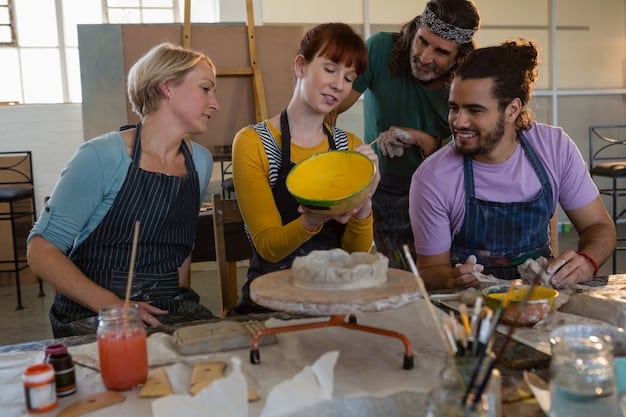Introvert’s Guide: 5 Easy Ways to Make New Friends

Making friends as an introvert can be challenging, but with the right approach, it’s entirely possible; this guide provides five low-pressure strategies to help introverts build meaningful connections and expand their social circles.
Navigating the social landscape can feel like traversing a minefield if you’re an introvert. The good news is that building meaningful relationships doesn’t require you to overhaul your personality. This The Introvert’s Guide to Making Friends: 5 Low-Pressure Approaches offers actionable strategies tailored for introverts to forge connections without sacrificing their comfort or energy.
Understand Your Introverted Strengths
Before diving into specific strategies, it’s vital to recognize and appreciate your unique introverted strengths. Often, introversion is mistakenly equated with shyness or social anxiety, but it simply means you recharge your energy through solitude rather than social interaction. Understanding this fundamental difference can empower you to approach friendship-building in a way that feels authentic and sustainable.
The Power of Observation
Introverts are often keen observers, noticing details that others might miss. This can be a significant advantage in social situations, allowing you to glean insights into people’s interests and personalities before initiating a conversation.
Meaningful Conversations
Unlike extroverts who might thrive on small talk, introverts typically prefer deeper, more meaningful conversations. This preference can be a strength, as authentic interactions tend to create stronger bonds.
- Embrace your need for downtime to recharge after social interactions.
- Leverage your listening skills to build rapport and show genuine interest in others.
- Don’t be afraid to initiate conversations on topics you’re passionate about.
By acknowledging and leveraging these strengths, you can approach friendship-building with confidence and authenticity. Remember, the goal isn’t to become someone you’re not, but rather to find ways to connect with others that feel natural and fulfilling.

Embrace One-on-One Interactions
Large social gatherings can be overwhelming for introverts, often leading to feelings of exhaustion and a desire to retreat. A more manageable and enjoyable approach is to focus on one-on-one interactions. This allows you to engage more deeply and build genuine connections without feeling drained.
Coffee Dates and Casual Lunch
Suggesting a casual coffee date or lunch is a low-pressure way to get to know someone better. These settings provide a relaxed atmosphere that encourages conversation and allows you to gauge compatibility.
Walking and Talking
Combining conversation with a leisurely walk can be particularly effective for introverts. The physical activity can help ease social anxiety and provide a natural buffer if the conversation lulls.
- Choose a quiet and comfortable setting for one-on-one interactions.
- Prepare a few conversation starters to help break the ice.
- Listen actively and show genuine interest in what the other person has to say.
By focusing on one-on-one interactions, you can create a more intimate and meaningful connection, fostering friendships that are built on genuine understanding and shared interests.
Find Your Tribe Through Shared Interests
One of the most effective ways for introverts to make friends is by connecting with people who share their interests. This provides a natural foundation for conversation and shared experiences, making it easier to build meaningful relationships.
Join Clubs and Groups
Whether it’s a book club, a hiking group, or a photography club, joining a group based on your interests is a great way to meet like-minded individuals. The shared passion provides an easy conversation starter and a sense of belonging.
Volunteer Your Time
Volunteering for a cause you care about not only makes a positive impact but also connects you with people who share your values. Working side-by-side on a meaningful project can create strong bonds and lasting friendships.
- Research local clubs and groups that align with your interests.
- Attend introductory meetings to get a feel for the group dynamic.
- Don’t be afraid to initiate conversations with other members.
By finding your tribe through shared interests, you can build friendships that are based on genuine connection and mutual enjoyment, creating a supportive and fulfilling social circle.

Leverage Online Communities
In today’s digital world, online communities offer a unique and accessible way for introverts to connect with others. Whether it’s through social media groups, online forums, or virtual events, these platforms provide a low-pressure environment to build relationships.
Join Online Forums and Groups
Platforms like Reddit, Facebook Groups, and Discord offer a plethora of communities dedicated to various interests. Participating in these groups allows you to engage in conversations, share your thoughts, and connect with people from all over the world.
Attend Virtual Events
Many organizations and communities now offer virtual events, such as webinars, workshops, and online meetups. These events provide a structured way to engage with others who share your interests without having to leave the comfort of your home.
- Choose online communities that align with your interests and values.
- Start by lurking and observing the group dynamic before actively participating.
- Engage in conversations and share your thoughts in a thoughtful and respectful manner.
By leveraging online communities, you can build friendships that transcend geographical boundaries and create a supportive network that enriches your life from the comfort of your own home.
Practice Self-Care and Set Boundaries
As an introvert, it’s vital to prioritize self-care and set boundaries to protect your energy. Overextending yourself socially can lead to burnout and a desire to withdraw, hindering your ability to build and maintain friendships.
Schedule Downtime
Make sure to schedule regular downtime in your week to recharge and rejuvenate. This could involve reading a book, taking a bath, or simply spending time in nature. Prioritizing your own well-being is essential for maintaining healthy relationships.
Learn to Say No
It’s okay to decline social invitations if you’re feeling overwhelmed or need time to yourself. Learning to say no without guilt is a crucial skill for introverts, allowing you to prioritize your own needs and maintain a healthy balance in your life.
- Identify your energy drains and triggers for social anxiety.
- Communicate your needs and boundaries clearly to your friends.
- Don’t be afraid to prioritize your own well-being.
By practicing self-care and setting boundaries, you can protect your energy and create a sustainable approach to friendship-building. Remember, healthy relationships are built on mutual respect and understanding, including the need for personal space and downtime.
| Key Point | Brief Description |
|---|---|
| 💡 Understand Strengths | Acknowledge introverted qualities like observation. |
| 🤝 One-on-One | Focus on individual interactions that are less draining. |
| 🌱 Shared Interests | Join groups with people who share your hobbies. |
| 💻 Online Communities | Use forums to connect in a low-pressure setting. |
FAQ
▼
Absolutely! Introverts can form deep and meaningful friendships by focusing on quality over quantity and embracing their natural strengths in communication and empathy.
▼
Introverts can manage social gatherings by setting boundaries, arriving early to acclimate, focusing on one-on-one conversations, and taking breaks when feeling overwhelmed.
▼
Good conversation starters include asking open-ended questions about shared interests, commenting on the environment, or discussing current events that relate to the group.
▼
Introverts need more downtime because social interactions deplete their energy, and solitude helps them recharge and process their experiences, fostering better mental and emotional health.
▼
Introverts can set boundaries by clearly communicating their needs, declining invitations when necessary, and prioritizing self-care without feeling guilty, ensuring their well-being.
Conclusion
Making friends as an introvert doesn’t have to be a daunting task. By understanding your strengths, embracing low-pressure approaches, and prioritizing self-care, you can build meaningful connections that enrich your life and foster a fulfilling social circle.





